The demand for nootropic brain supplements is higher than ever. As a result, consumers are faced with a dizzying array of nootropic choices. Prevagen and Neuriva are two popular options that have gained attention for their claims to boost cognitive function.
Prevagen, known for its unique ingredient, apoaequorin, has gained a devoted following for its claimed memory-enhancing properties. On the other hand, Neuriva, with its blend of coffee cherry extract and phosphatidylserine, positions itself as a powerful brain health supplement. Both products make bold assertions, but do they live up to the hype?
In this article, we compare Prevagen and Neuriva head to head to discover whether either is an effective brain booster. Spoiler: they aren't – spend your money on NooCube instead.
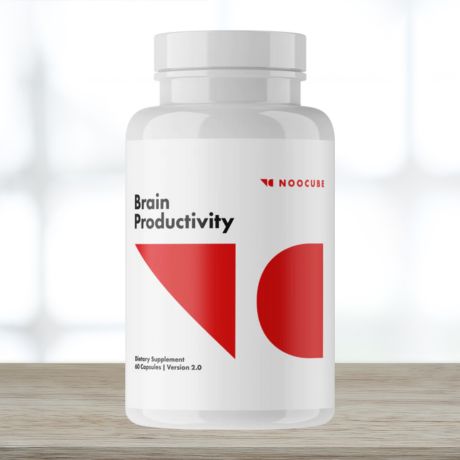
NooCube works alongside your daily routine as a functional nootropic — allowing you to get more accomplished in a 24-hour period without feeling overwhelmed by...
Neuriva vs. Prevagen: A Closer Look
Throughout this article, we will compare the ingredient profiles of Neuriva and Prevagen and why they were included in the formulation. We'll then drill down on the scientific backing, or lack thereof, to find out whether those ingredients are actually going to do you any good. We'll also compare the cost of these two nootropic supplements, explore what customers think of them, and answer common questions about Nueriva and Prevagen.
- Well researched ingredients
- Single pill dosage
- Fairly priced
- Well researched ingredients
- Proper glucomannan dose
- Low stimulant content
Understanding the Basics
Neuriva is a nootropic brain supplement created by Schiff Vitamins designed to boost memory and overall brain function. Neuriva claims that its product can improve memory recall, assisting users in more efficiently remembering crucial pieces of information. It is intended to boost overall brain health by nourishing brain cells and encouraging cognitive energy.
In order to attain these cognitive benefits, Neuriva uses two natural ingredients: phosphatidylserine and coffee fruit extract. However, the research on both of these ingredients is far from conclusive.
Neuriva comes in a number of forms, including capsules, gummies, and tablets.
There are two versions of the capsule form of Neuriva. The first, known as Neuriva Original, contains 100 mg each of phosphatidylserine and coffee fruit extract. The other, which is considerably more expensive, is known as Neuriva Plus. This version boosts the amount of coffee fruit extract to 200 mg and includes 1.7 mg of vitamin B6 and 2.5 mcg of vitamin B12.
Schiff International dates back to the 1930s. In 2012, it was acquired by Reckitt Benckiser Group PLC (RB), a multinational consumer goods company. They are now part of Bayer Consumer Health and produce a range of health supplements under the brand names Move Free, Airborne, and MegaRed.
Memory improvement is also the primary emphasis of Prevagen, which was developed by Quincy BioScience and is noted for its distinctive ingredient, apoaequorin. This ingredient is produced from jellyfish and is thought to improve brain health by increasing calcium regulation in brain cells. Another focus is the preservation of good cognitive function, improving brain health as we age.
Prevagen is a product of Quincy BioScience, a biotech company operating out of Madison, Wisconsin. The company was founded in the early 2000s with the goal of researching and developing innovative products to support brain health and cognitive function. Prevagen is the company's flagship product. In 2012, Quincy BioScience faced a class-action lawsuit claiming that they used deceptive advertising to promote Prevagen. It has since made changes to its advertising in response to legal challenges.
Prevagen is also meant to clear up cloudy thinking and reduce mental haziness. In comparison to Neuriva, Prevagen is more geared towards elderly people, as it claims that it can offset age-related cognitive decline. There are just two ingredients in Prevagen - apoaequorin, which comes from a type of jellyfish, and vitamin D3. It comes in capsule and chewable form, with the recommended dosage being one capsule per day.
Prevagen is available in both regular and extra-strength versions. The regular version contains 50 mcg of vitamin D3 and 10 mg of apoaequorin, while the extra strength version boosts the apoaequorin level to 20 mg. The two products have a $20 difference, making the extra-strength version of Prevagen relatively expensive in the nootropic market.
Ingredient Breakdown
Both Neuriva and Prevagen contain unique ingredients that are claimed to provide special benefits that catapult them above the competition. Let's explore each product's ingredient profile and why they've been included. We'll then examine the science to see whether they'll really offer the promised benefits.
Neuriva Ingredients

There are just four active ingredients in Neuriva. While a lot fewer than most nootropics we review, it wouldn't be a problem if they performed as promised. Here's what you get and why they've been included:
1. Vitamin B6
Vitamin B6, or pyridoxine, is needed for a range of biological functions, including those affecting the brain. It is not considered a primary nootropic, usually being added in more of a support role. B6 is needed for the creation of such neurotransmitters as norepinephrine, dopamine, and serotonin. All of the chemicals play a role in mood regulation and cognitive performance.
Vitamin B6 also helps damp down homocysteine levels, an amino acid that may cause cognitive deterioration. This vitamin is also involved in the metabolic processes that create energy, which may help boost mental energy. A final potential benefit of Vitamin B6 for brain performance is that it contributes to the production of red blood cells, which are needed to supply oxygen to the brain.
2. Vitamin B12
Vitamin B12, or cobalamin, is another supporting ingredient that is not considered a traditional nootropic ingredient. As with vitamin B6, its validity for inclusion rests on the supporting role it plays in cognitive functioning. B12 is involved in forming myelin, a protective sheath around nerve fibers. Deficiency of this vitamin may lead to memory loss, brain fog, and difficulty paying attention.
Vitamin B12 also plays a role in the metabolic processes involved in energy production. Just like vitamin B6, it is also linked to the production of key mood-regulating neurotransmitters such as dopamine and serotonin.
3. Coffee Fruit Extract
Coffee fruit extract comes from the fruit that surrounds coffee beans and should not be confused with coffee beans themselves, which are roasted and ground to form coffee. The fruit extract is a rich source of antioxidants, with the main one being chlorogenic acid. Antioxidants help prevent the free radical cell damage that results from oxidative stress. In this way, it is claimed that coffee fruit extract may have neuroprotective properties.
It has also been suggested that the anti-inflammatory and antioxidant properties of coffee fruit extract may improve memory and boost mental alertness.
4. Phosphatidylserine
Phosphatidylserine is a phospholipid, which is a type of lipid that is found in brain cell membranes. It is needed to properly function and form cell membranes, which is essential for communication between brain cells.
It is also thought that phosphatidylserine can improve memory and general brain functioning, especially in the elderly. It is believed that it has a neuroprotective ability, helping to support cognitive function and ward off the effects of age-related cognitive decline.
It is claimed that dietary supplementing with phosphatidylserine may assist in lowering the response of the body to stress. It may indirectly assist cognitive performance in stressful settings by moderating the release of stress hormones like cortisol.
Prevagen Ingredients
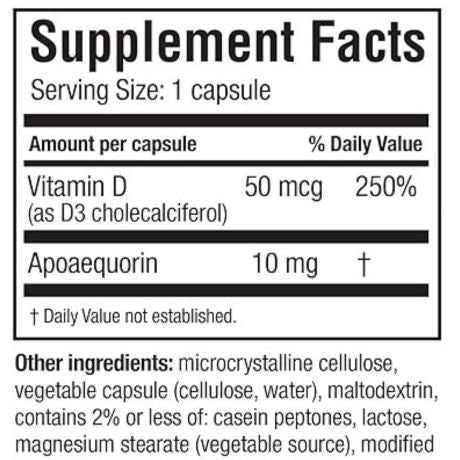
There are just two ingredients in Prevagen - half as many as in Neuriva! Here's an overview of their claimed benefits and why Quincy BioScience has included it in their formula.
1. Vitamin D3
Vitamin D is not traditionally considered a top-of-the-line nootropic ingredient. It is far better known for its role in enhancing calcium absorption to promote healthy bones, teeth, and gums. It is important to get sufficient amounts of vitamin D to prevent conditions like osteoporosis. It also plays a role in supporting the immune system.
There is limited study connecting vitamin D with cognitive function. It has been suggested that this vitamin may assist in promoting neuroprotection, neuroplasticity, and the prevention of neurodegenerative diseases.
It should be noted that regulatory bodies have been looking into the effectiveness of Prevagen, especially the part that vitamin D3 plays in its formulation. Claims made by the manufacturer have been called into question in terms of their ability to be supported by scientific evidence, in particular those claims that relate to an enhancement in memory.
2. Apoaequorin
Apoaequorin is a unique ingredient found in Prevagen. It is a form of protein that comes from a species of jellyfish called Aequorea victoria. This protein comes from the bioluminescent organs of the jellyfish. According to the marketing for Prevagen, apoaequorin promotes brain functioning by binding to calcium ions in brain cells. It has been claimed that, as we age, calcium levels in our brain cells increase, leading to cognitive decline. Apoaequorin is thought to help regulate these calcium levels.
The Science Behind The Ingredients
When you spend good money on a nootropic, you rightly expect that it will include ingredients that have solid research support. In the cases of both Neuriva and Prevagen, however, scrutiny of their ingredients and claims has revealed substantial concerns about scientific support, regulatory actions, and the availability of these ingredients through a balanced diet.
Here are some areas of concern:
- Regulatory Concerns: Both Neuriva and Prevagen have been the subject of regulatory scrutiny because of the marketing claims made for them and the scientific research that supports the components that they contain (specifically apoaequorin in Prevagen and phosphatidylserine in Neuriva). Both the Federal Trade Commission (FTC) and the Food and Drug Administration (FDA) of the United States have taken action against Prevagen for making claims that they believe are not adequately supported by the available evidence. This encompasses claims made regarding improvements to one's memory.
- Lack of Solid Research: Apoaequorin, the main ingredient in Prevagen, has been advertised as a way to boost cognitive function by controlling calcium levels in brain cells. Yet, the scientific evidence to support his claim is inconclusive at best. There are very few studies that show any cognitive benefits of apoaequorin in healthy people. Worse still, researchers have identified a few adverse side effects with this compound.
- In a 2016 study, some potential beneficial effects in terms of verbal learning were seen in older adults as a result of apoaequorin supplementation. However, the researchers also noted such side effects as stomach upset, constipation, nausea, and headaches.¹
- When it comes to the other ingredient in Prevagen, Vitamin D3, most people get enough of it from their food and from spending time in the sun. Besides, there is very little real understanding as to the role that Vitamin D3 plays in cognitive health. As a result, the inclusion of vitamin D in Prevagen seems to be redundant.
- While both Phosphatidylserine and Coffee Fruit Extract show some promise regarding cognitive benefits, the scientific data in support of them is still emerging. The only existing research suggests that supplementing with phosphatidylserine may have cognitive benefits for the elderly.²
- More research is needed before it can be unequivocally stated that either of the key ingredients in Neuriva is beneficial.
- Sufficient Nutrient Intake: Half of the ingredients in Neuriva and Prevagen are vitamins that are readily found in everyday foods. If you are eating a healthy, well-balanced diet, you will be getting a plentiful supply of them without the need to supplement. As a result, the inclusion of Vitamins B6., B12, and D3 in these products is pretty much redundant.
Neuriva Vs. Prevagen: The Cost
Both Neuriva and Prevagen are offered in regular and extra-strength versions. Here's a breakdown of what you'll pay for each of them:
- Neuriva Original: Neuriva Original is priced at $32.99 for a 30-day supply, translating to $1.10 per daily dose. This makes it a comparatively affordable option for individuals looking to enhance their cognitive function without a substantial initial investment.
- Neuriva Plus: The Neuriva Plus version, with its enhanced formulation, is priced at $49.49 for a 30-count bottle on the official website. That comes to $1.65 per daily serving, representing a substantial increase over the original version. Yet the only difference between them is that the amount of coffee fruit extract is 200 mg and includes 1.7 mg of vitamin B6 and 2.5 mcg of vitamin B12.
- Prevagen Regular Strength: Prevagen Regular Strength is available for $39.95 for a 30-day supply, which also equates to $1.33 per daily dose.
- Prevagen Extra Strength: For those seeking a higher dosage of apoaequorin, the Prevagen Extra Strength version is available at $59.95 per bottle (30 capsules). That comes to about $2.00 per day, making this a very expensive nootropic supplement.
Discounts and Subscriptions:
- Neuriva: Neuriva operates a loyalty program where customers can earn 10 points for every dollar spent (equivalent to 330 points for a single product purchase). These points mainly provide access to sales events and minor loyalty rewards.
- Prevagen: Prevagen consistently offers 15% discounts on its website.
Neuriva Vs. Prevagen Customer Reviews
When it comes to evaluating the effectiveness and value of Neuriva and Prevagen, it's essential to consider the wealth of feedback from real users. Numerous Reddit threads offer a glimpse into the experiences of individuals who have tried these products, and the majority of these comments tend to be negative.
One Reddit user shared their experience, stating:

(Source)
Another Reddit user expressed skepticism about Neuriva, saying:
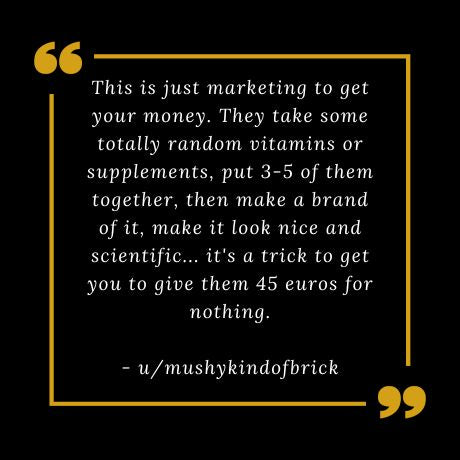
(Source)
In addition to Reddit threads, customer reviews on various platforms also provide insights into the user experience with these products. Neuriva appears to have a mix of positive and negative reviews. Positive reviews often come from older individuals who claim it helped with mild memory loss. However, younger users frequently reported no benefits or minimal effects, leading some to question its value for the money.
For Prevagen, customer reviews also show a mixed picture. While it has an average rating of 4.4 out of 5 stars on Amazon, many negative reviews indicate that it did not provide any noticeable benefits. Here's a typical comment:
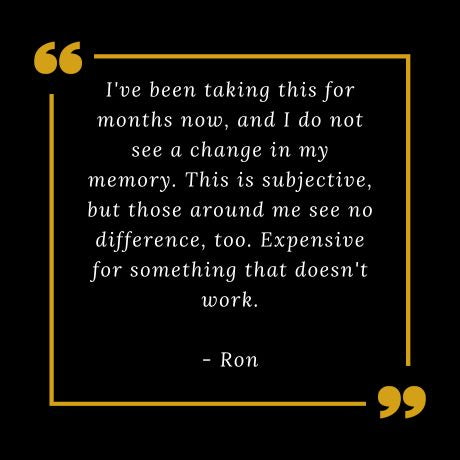
(Source)
These real-world experiences highlight the variability in user responses to Neuriva and Prevagen. It's important to keep in mind that individual factors can significantly influence the outcomes when using cognitive enhancement supplements.
However, it's also worth noting that both Neuriva and Prevagen have faced legal issues regarding their marketing practices. Quincy BioScience, the manufacturer of Prevagen, has had regulatory challenges related to its claims. This underscores the importance of treating their information with a level of skepticism.
Conclusion
Neuriva and Prevagen have established themselves as two of the leading competitors in the market for cognitive improvement products. However, our investigation into these products indicates that they do not live up to the claims made. Both products have been subject to regulatory examination, and the scientific evidence that supports their ingredients is lacking.
We recommend NooCube as an alternative to both Neuriva and Prevagen. Noocube has a well-researched formula that is specifically designed to improve cognitive function. It also has a huge amount of customer and reviewer support, making it one of the most popular nootropics on the planet.
Check out our comprehensive NooCube review.

NooCube works alongside your daily routine as a functional nootropic — allowing you to get more accomplished in a 24-hour period without feeling overwhelmed by...
Prevagen vs Neuriva FAQs
What are the serving sizes?
The serving size for all four products - Neuriva Original, Neuriva Plus, Prevagen, and Prevagen Extra - is one capsule per day.
What are the side effects?
The following is a list of potential adverse effects and other things to keep in mind when using each of these supplements:
Here are the main side effects of these two products:
Neuriva
- Gastrointestinal problems, including nausea, gas, bloating, and diarrhea.
- Allergic Reactions, with such symptoms as skin rash, breathing difficulty, and rash.
- Interactions with specific prescribed medications.
Prevagen
- Stomach discomfort, similar to Neuriva.
- Headaches, which are usually quite mild.
- Interactions with Anticoagulants such as warfarin
- Allergic Reactions
What is better, Neuriva or Prevagen?
We do not recommend either Neuriva or Prevagen, as their ingredient profiles do not stack up to close scrutiny. However, if you are set on purchasing one of these nootropics, we recommend buying the original version of Neuriva as it is the most effective. Our recommended nootropic, though, is NooCube, which has a much stronger ingredient profile with research-supported compounds that are dosed according to clinical studies.
Who should take Neuriva or Prevagen?
Neuriva and Prevagen are both marketed to slightly different audiences. Neuriva is primarily intended for people with mild cognitive problems, such as problems focusing and the occasional memory lapse. It is marketed toward healthy adults looking to get a brain boost.
Prevagen is marketed more toward older people who are experiencing age-related mild cognitive impairment or decline. Those who are specifically interested in the supposed benefits of apoaequorin, the main ingredient in Prevagen, should also choose this product.
References
- Moran, Daniel L., et al. “Effects of a Supplement Containing Apoaequorin on Verbal Learning in Older Adults in the Community.” Advances in Mind-Body Medicine, vol. 30, no. 1, 2016, pp. 4–11, pubmed.ncbi.nlm.nih.gov/26878676/.
- Kim, Hee-Yong, et al. “Phosphatidylserine in the Brain: Metabolism and Function.” Progress in Lipid Research, vol. 56, Oct. 2014, pp. 1–18, https://doi.org/10.1016/j.plipres.2014.06.002.


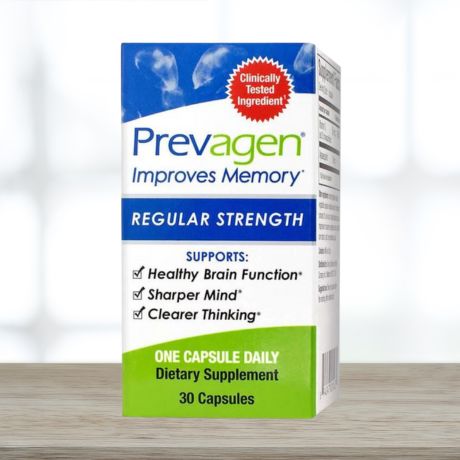
0 Comments